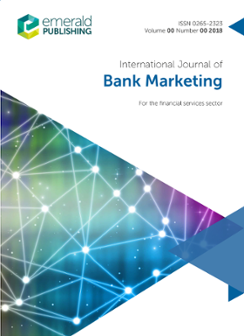Toward an understanding of Pakistani customers' adoption of smart banking services: an extended application of UTAUT2 model with big brother effect and information privacy concern
IF 6.3
3区 管理学
Q1 BUSINESS
引用次数: 0
Abstract
PurposeThis study examines the main factors influencing banking customers' behavior toward smart banking services (SBS) adoption in Pakistan. This study extends the unified theory of acceptance and use of technology (UTAUT2) by integrating information privacy concern and big brother effect into an overarching conceptualization.Design/methodology/approachThis study adopts theoretical constructs from the related literature and develops hypotheses. An analysis of 385 banking customers was performed using partial least squares structural equation modeling (PLS-SEM).FindingsThe results show that most predictors of behavioral intention, including facilitating conditions, effort expectancy, habit, performance expectancy, hedonic motivation (except for social influence and price value), big brother effect and perceived information privacy concern are significant. Indeed, all predictors of use behavior are also significant. Gender and age differences between individuals further moderate the relationship between UTAUT2 constructs. Moreover, information privacy concern mediates the relationship between big brother effect and behavioral intention.Research limitations/implicationsThis cross-sectional study focused only on Pakistan as a developing country, which limits the generalizability of the results.Practical implicationsThe roles of social influence and price value must be strengthened by employing marketing strategies and personalized communication. Banks should offer incentives and rewards to customers who recommend SBS to friends and family members. In addition, banks must consider the price factor when offering these services to increase their market share.Originality/valueThis study contributes to the field of technology adoption by providing a unique perspective of SBS adoption in Pakistan. This empirical study is the first to extend the UTAUT2 model by integrating information privacy concern and big brother effect to assess SBS acceptance and use behavior. This study examines SBS adoption issues at the national level, especially in Pakistan.了解巴基斯坦客户对智能银行服务的采用:考虑老大哥效应和信息隐私的UTAUT2模型的扩展应用
目的本研究考察了影响巴基斯坦银行客户采用智能银行服务(SBS)行为的主要因素。本研究通过将信息隐私问题和老大哥效应整合到一个总体概念中,扩展了技术接受和使用的统一理论(UTAUT2)。设计/方法论/方法本研究采用了相关文献中的理论结构,并提出了假设。采用偏最小二乘结构方程模型(PLS-SEM)对385名银行客户进行了分析。结果表明,大多数行为意向的预测因素,包括便利条件、努力预期、习惯、绩效预期、享乐动机(社会影响和价格价值除外),“老大哥效应”和感知信息隐私问题显著。事实上,所有使用行为的预测因素也是重要的。个体之间的性别和年龄差异进一步缓和了UTAUT2结构之间的关系。此外,对信息隐私的关注在“老大哥效应”与行为意向之间起着中介作用。研究局限性/含义这项横断面研究只关注作为发展中国家的巴基斯坦,这限制了结果的可推广性。实践含义必须通过采用营销策略和个性化沟通来加强社会影响力和价格价值的作用。银行应向向朋友和家人推荐SBS的客户提供激励和奖励。此外,银行在提供这些服务时必须考虑价格因素,以提高其市场份额。独创性/价值本研究通过提供巴基斯坦SBS采用的独特视角,为技术采用领域做出了贡献。这项实证研究首次通过整合信息隐私关注和老大哥效应来评估SBS的接受和使用行为,从而扩展了UTAUT2模型。本研究调查了国家一级,特别是巴基斯坦采用SBS的问题。
本文章由计算机程序翻译,如有差异,请以英文原文为准。
求助全文
约1分钟内获得全文
求助全文
来源期刊

International Journal of Bank Marketing
BUSINESS-
CiteScore
10.70
自引率
18.90%
发文量
54
期刊介绍:
International Journal of Bank Marketing (IJBM) aims to publish papers that relate to the marketing challenges of financial services providers around the globe.
Preference is given to empirically-based research papers that expand on existing theories (or develop new ones) on customer behaviour in financial services settings.
In addition, the journal is interested in helping academicians and practitioners in the field to better understand the discipline of financial services marketing, and as a result review papers and thought pieces are invited for submission.
 求助内容:
求助内容: 应助结果提醒方式:
应助结果提醒方式:


